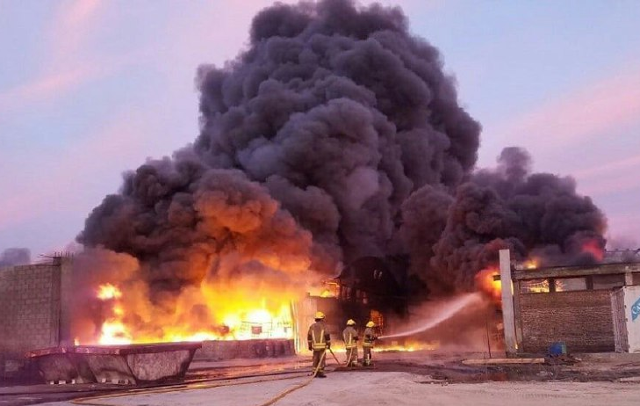
A toxic agroeconomy: big agriculture’s impact in Argentina causes public health disasters
16 November, 2023A toxic agro-economy: big ag fuels public health disasters in Argentina
September 2023 marked the fourth anniversary of the 2019 explosion in Mercedes, Argentina, of an illegal agrochemical deposit owned by global agrochemical firm, SIGMA AGRO — the same company responsible for the explosion of a truck transporting herbicides along a highway earlier this year in Ituzaingó. The fumigated towns are rising up to demand accountability and an end to toxic agriculture. A march in Bs.As.city is planned for December 2023.
By Pablo Andrés Bobadilla Echenique
On a hot day in February 2023 with temperatures reaching above 100℉ – during a summer with 9 consecutive heat waves – a truck was spilling a chemical with a strong noxious odor in the middle of a highway in Ituzaingó, a rural town in Argentina’s Buenos Aires province. At 4pm, the police, the National Guard, and 80 firefighters arrived on the scene while thousands of people passed by without knowing what the truck was emitting. Even the driver said he did not know what agrochemicals were inside, but the container he was transporting was above 302℉.
Images of the cloud began to flood social media. No one knew the cloud over the highway was spreading thousands of liters of clethodim imported from China: an herbicide known to be combustible, induce development toxicity in animals, and impact the central nervous system. Four firefighters were hospitalized due to intoxication, and one fainted on the spot. Fifteen adults and four children were taken to the hospital with symptoms of intoxication. At 10pm, the truck caught fire.
At the time, no one said that the truck was heading to General Rodríguez: a SIGMA AGRO operational base – SIGMA AGRO, the same agrochemical company responsible for the 2019 explosion of an illegal agrochemical deposit that released a million liters of dangerous agrochemicals glyphosate, ammonium glufosinate, paraquat, 2,4-D, atrazine, chlorpyrifos, lambda, and bifenthrin into the air. This earlier agrochemical explosion occurred next to a public school on September 27, 2019, in La Verde, a rural neighborhood of Mercedes in Buenos Aires province, which seriously injured a firefighter and killed worker Rubén Ponce, who died 6 days later from burns endured after falling into a trench while trying to recover a machine that he rented to SIGMA. The trench contained liquid that was spilled during the explosion.
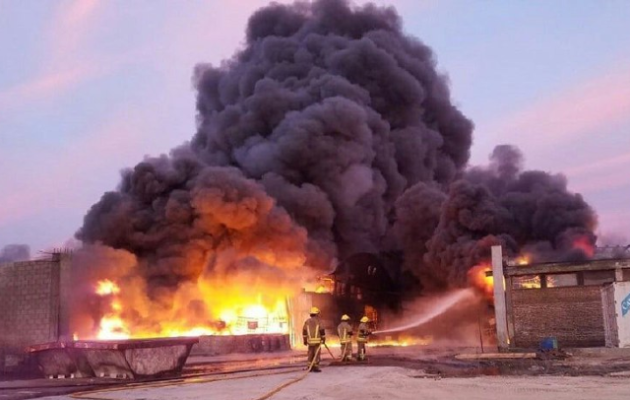
The 2019 explosion was ranked as the fourth global disaster of its kind. Still it only resulted in Argentina’s Environmental Control Organism (OPDS) issuing a small fine of 8,000,000 Argentine pesos (at the time, the equivalent of $6,000 USD). SIGMA still faces two penal cases in court and two civil claims following the 2023 explosion.
The devil is in the retail
“The area in which the 2019 explosion occurred never became green again. You look at the satellite photos, and 4 years later, you see the yellow stain in the place the explosion occurred at the headwaters of the Luján River and the Balta stream. The responsibility is not just the company’s; it is also a governmental, municipal, provincial, and should also be a national responsibility. The fire, high pressures, and temperatures during the explosion may have generated new molecules from the mixture of highly toxic gasses, new molecules we may not yet know. To put it another way, the explosion unleashed a chemical hell that no one could predict,” says Martín Barros, who lives 2 km away from SIGMA’s depot in the La Verde neighborhood of Mercedes.
Martín is an organic seed producer, sociologist, and agriculturist who keeps bees alongside his life partner Bárbara Rivkin, a former literature professor. We spoke in the shop of a gas station in the center of Mercedes while the couple made a stop during their routine; they had been out all morning buying supplies and sending seeds by mail for their customers. The economic activity in this bucolic town is rooted in large polo courts, cattle breeders, and extensive alfalfa and grain crops. Global elites are regular tourists here and often the buyers of polo horses. As every little town Mercedes has its own hell, that SIGMA made larger.
Martín recalls the night of the explosion,“My house shook, and I got up to see what had happened. I saw the flames that night, a tower of fire more than 20 meters high. After a while, the air was unbreathable. First, the smell of paraquat, then plastic, and then fuel. All of those products are based on gas oil. Even God doesn’t know what happened that night. It was diabolical chemistry,” Martin recalls. In Mercedes, the tallest building is still the cathedral. In the central square there is a bronze plaque that reads: “1492-1992 V centenary of the evangelization of the Americas.” The tower of fire that Martín describes stands taller than the church.
He continues, “We’re not just talking about agrochemicals but concentrated agrochemicals. Biodiesel and diesel are used to dilute them because they are cheap and produced in Argentina. SIGMA imports concentrated glyphosate salt and then adds these diluents in the plant. This gives the product a fatty base. So, for example, if 1 million liters of agrochemicals had burned, the real calculation must be multiplied many times over, accounting for the stock of paraquat and glyphosate concentrates, among other herbicides, in the SIGMA plant,” he adds.
Martín knew very well what agrochemicals are capable of long before the explosion. “I participated in the first study of agrochemicals on a private ranch in 1994 with roundup ready soy. Later I took courses provided by Panos Manikis at various locations in Argentina.” Panos was a disciple of Masanobu Fukuoka to whom he entrusted the task of continuing his work in spreading his natural method of agriculture. Martín is also permaculture-certified through a course taught by David Holmgren, an ecologist and one of the creators of “permaculture” and, since 2003, produces organic seeds with Bárbara, convinced there is no need to use agrochemicals.
“I’ve resisted using agrochemicals, and anyone who uses them, shortly after, the consequences of using them become apparent. It is one thing to desire to do business and quite another is to accept and understand nature’s abundance… ‘Agrotoxics’ do not fit the ladder path because no chemicals are necessary when you work in harmony with nature. In fact, they are largely responsible for this loss of harmony with nature we now face.”
The 2019 explosion occurred around 4 AM. After the explosion and the following morning, firefighter teams from Mercedes and the surrounding districts began to arrive. In total, there were 11 teams with 5,000 liters of water in each fire truck plus water replenished from local sources. All that water was used to extinguish the fire but its use will cause an even bigger problem: the accumulation of agrochemical particles into the local water supply and their absorption into the soil.
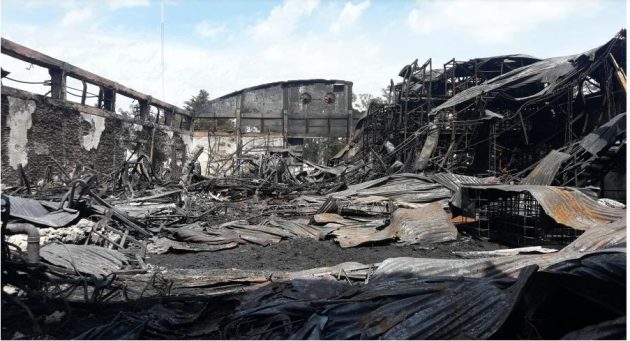
Martín’s life partner, Bárbara, was in Buenos Aires the night of the explosion. The next morning Martín took the car and evacuated other family members. “The whole place was a big purple lagoon. At our house, the bees died,” he recalls.
Stranger things
Following the 2019 explosion, two penal and two civil suits against SIGMA were filed and remain open. One small fine has been issued in connection with the explosion, but the rest of the pending suits have yet to wrap up, much to the dismay of locals. Bárbara elaborates, “The glaring judicial inaction demands attention. The explosion and truck fire this year should compel the judges to render a verdict. The judges have no way out because of what happened in Ituzaingó; it forces them to make a resolution. This already weighs on them because, unlike the event here, which was in a remote place, this time it happened right in the center of a provincial highway. In regards to the criminal case over the death of Rubén Ponce, although we are not pleased with the delay, there are at least charges. This past autumn, we appeared before Judge Cintia Soto from the Civil and Commercial Court No. 10 of Mercedes. She’s in charge of the civil case, and she told us that she would issue a judgment. We’re still waiting. It’s all painfully slow,” she reflects.
Martín chimes in, “This isn’t an isolated incident; it’s their established method of operation. SIGMA was created to do the dirty work for their investors out of China. They came to install the plant in Mercedes knowing full well the risks and with the complicity of the authorities. The truck passing on the highway may have been a singular occurrence, but how many containers in similar conditions arrive by ship daily?”
As for the status of the other ongoing suits against SIGMA, Martín continues, “Only SIGMA’s attorney made a statement to the police; no employees did. What is known about what SIGMA was doing there is known through statements from Gustavo Ruffa to the police. The videos of the employees arrived as evidence. I don’t know how. In fact, they called me as a witness to see where I had obtained those videos. I told the prosecutor honestly: in the middle of the chaos that followed this, I was in 15,000 social networks groups; I had no idea about my phone, I told him. Besides, it’s not the same phone; I lost the original. Bárbara and I are the only ones called to testify. They didn’t call the firefighters, nor did anyone from the company testify.”
Fifteen days after the 2019 explosion, the couple reached to the NGO Organización de Ambientalistas Autoconvocados (OAA) and presented a joint demand asking the judge for an environmental protection precautionary measure, which is a tool granted by Argentina’s current constitution established in 1994 that allows civilians to seek urgent protection from the law when their constitutional rights have been violated. They also gathered the neighbors and talked to the media and, in December 2021, a meeting of communities from Buenos Aires province that have been impacted by agrochemicals was held in Mercedes, the “11th encounter of fumigated towns.” It was supposed to be held in March of 2020 but the pandemic postponed it.
Gathering of the fumigated towns
In 2007, the first gathering of the “fumigated towns” within Buenos Aires province was organized in Los Toldos, a town 300 km north of Buenos Aires City with a population of 13,000. Margot Goycochea along with the recently deceased agriculturist and activist Jorge Rulli planted the seed of what is now a national movement. Los Toldos hosted three gatherings and, over 15 years, developed claims to protect the environment and the population.
The lawyer and activist Fernando Cabaleiro, founder of Naturaleza de Derechos, another NGO that gives legal assistance to communities, described the gatherings as “a democratic and popular movement that carried out activism to make visible an environmental problem that spans half of the territory of a country in which agribusiness is state policy.”
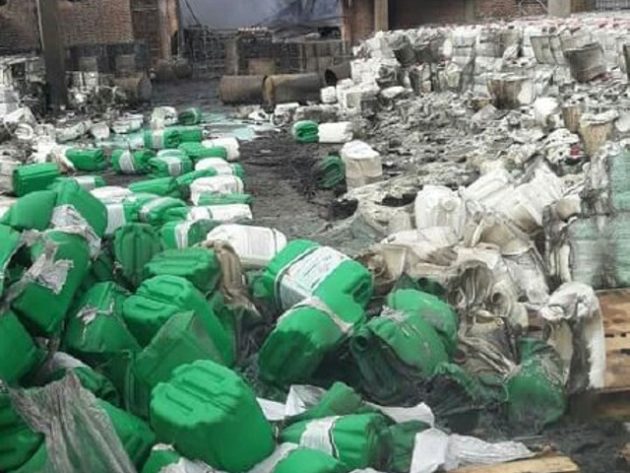
In an interview with Margot Goycochea for Naturaleza de Derechos website, she stated: “I met Rulli, who was preparing his report on fumigated towns, and together we organized the first meeting of the Stop Fumigation campaign here in Los Toldos in 2007. It was a surprise for the people of Toldos. It was open, many people stood up. There were many people who were against the meeting; other people began to open their eyes. That meeting was important because they began to see these things.”
In the early 2000s, scientists like Andrés Carrasco and Javier Souza Casadinho denounced pesticides, fertilizers, and herbicides – evidencing their harmful impacts. Carrasco was a doctor who specialized in molecular biology and developmental biology. Among other important positions, he was president of CONICET and head of the University of Buenos Aires Embryology Laboratory. He suffered smear campaigns and was removed from his position in CONICET after he made public his investigations of the effects of agrochemicals. He testified in court in several cases against fumigation. He died in 2014 and is remembered and revered by the people of fumigated towns. Souza Casadinho is regional coordinator of the Action Network on Pesticides and their Alternatives in Latin America (RAPAL) and Professor in the Faculty of Agronomy of the University of Buenos Aires (FAUBA). He calls for the prohibition of pesticides, starting with the Highly Hazardous (HAP).
There were over 100 attendees at the 2021 meeting in Mercedes, representing towns across the entire province. I participated. After a round of talks, we discussed topics in small groups and voted in the closing assembly on a manifesto through which to organize a response to the ongoing issues faced by our communities. The local government organized a local agriculture fair with a stage and live music numbers in the same place, the park outside of an old train station. Municipal employees shared sheets recommending healthy food and local beans and legumes. Inside one of the converted warehouses of the train station, people tried to talk and listen to each other, while the sound of the municipality’s amplifiers flooded the space.
Part of the manifesto voted on in the meeting reads: “Agribusiness is only business for a few, and the millions of liters of agrochemicals that they throw over our heads are all we get from this system. We shout that agribusiness is not the way, yet the State continues to impose this path on us in an absolutely undemocratic manner. This is an agribusiness that not only fumigates entire towns but is also part of the disastrous food industry’s very machinery. Instead of producing healthy food, it generates commodities and harmful consumables for our bodies. It relies on petroleum for its production, contributes to climate change, destroys the life and fertility of the soil, promotes deforestation and fires to expand its borders, fosters social inequality and the concentration of wealth and power, and displaces entire communities. It is a system based on the profits of a few, rather than one that generates a better quality of life that is fair and responsible to all of humanity. Today, more than ever, it is necessary to talk about an alternative model that focuses on the responsible reproduction of life, the well-being of everyone (including future generations), and the care of natural common goods.” At the end of the meeting, the assembly chose the next host site: General Rodríguez for 2022.
The bad seeds
In 1996, Argentina became the first Latin American country to permit “Roundup Ready,” a package deal consisting of an herbicide made of glyphosate and transgenic direct sow seeds compatible with said herbicide, chief among them – soybeans. The law came prepared from the U.S. headquarters of Monsanto (the company later bought by Bayer). Soon after, the herbicide-seed pair was adopted by thousands of Argentine farmers.
By the new century, Argentina’s economy relied on commodity exportation. In 2021, Argentina exported $2.53B USD in soybeans, making it the world’s fourth largest soybean exporter and ranked among the highest users of pesticides and herbicides worldwide. Argentina is the third biggest user of pesticides in the world following China and the United States, but it ranks first when measured by liters of pesticides per person.
Argentina allows the use of 120 agrochemicals banned worldwide. Planes spray a chemical contained in Bayer’s best-selling herbicide Roundup over rural schools; glyphosate rains down meters away from the windows of houses. Used for over 30 years, atrazine dissolves in water and lives in aquifers and in bloodstreams. Linked to cancer, it interferes with the hormones that regulate anatomical development and functioning.
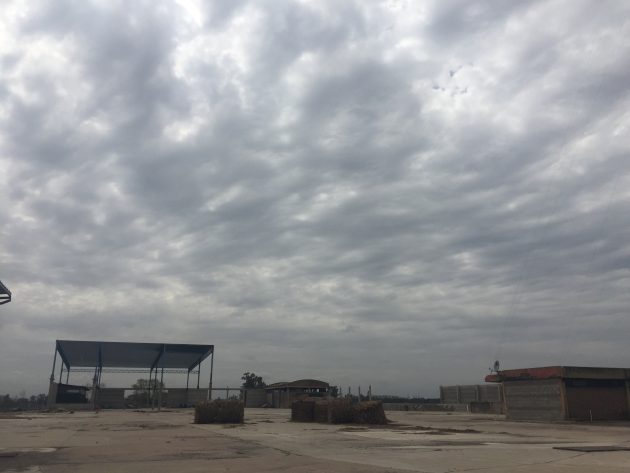
Blow up
SIGMA never released statements about the 2019 explosion in La Verde, Mercedes, or about the 2023 truck fire. Juan Jerónimo Araujo Muller, SIGMA’s president, and Gustavo Ruffa, SIGMA’s attorney, have been formally accused in the criminal case for the death of Ruben Ponce; though they never testified before the judge. The company tried to resume business in their Mercedes depot, but the neighbors stopped it by pushing the municipality to host public meetings and petitioning the judge to close the place.
While SIGMA has kept quiet on these issues, they have spoken up about their financial successes. On November 14, 2020, SIGMA AGRO was featured in Clarin Rural, the agribusiness section of one of the biggest Argentinian news media outlets, as “a strong player in the Argentine herbicide market, started ten years ago with an interesting idea: to establish deep connections with the plants that produce active ingredients and molecules in China and the brokers that export them on a global scale.” It goes on to say, “We travel up to three times a year to meet with the producers of these active ingredients and the intermediaries. The Chinese are long-term thinkers and highly value good conduct and reliability in doing business,” SIGMA’s President said in the interview.
Clarin Rural destacó: “In 2017, they had an annual revenue of $12 million USD. The following year this grew to $24 million USD, and in 2019 they climbed to $32 million. They project to close 2020 at $70 million USD. The financial growth is impressive: between 2017 and 2020, they quintupled the company’s income.” The interview reads, “Four years ago, we didn’t even have the plant, and now we are the second-largest factory in Argentina in terms of production volume.”
“We have 12 warehouses located in different productive regions of the country, with eight logistics companies providing services to us. Every week, 25 trucks depart to distribute our products throughout the country,” said Bautista Araujo Muller, Marketing Manager of SIGMA Agro. Over 70% of the paraquat herbicide used in the country comes from SIGMA Agro’s plant,” stated Bautista.
Since the explosion in Mercedes Sigma continued growing their business and in 2021 added the company Betta Biotechnology to SIGMA GROUP. Betta claims to be “committed to food security and new agriculture” and is part of the Argentine chamber of bio inputs (CABIO).
Underdevelopment tales
A regular trial takes around 5 years in Argentina. Fabián Maggi is one of the most specialized lawyers in environmental law in Argentina. He is the legal representative of Martín, Bárbara and OAA, the NGO that sponsors the demands against SIGMA.
He represents the cases against SIGMA. He founded OAA with his late partner, Gustavo Madeira, along with the activist and former teacher Erica Hahn. “The reality is that progress, as always, is very limited and slow. SIGMA executives were summoned but did not testify, so that is still pending without significant advancement. I’m referring to the issue of the explosion and the other one involving the truck, which, although action was taken very quickly, was somewhat surprising because it doesn’t usually happen. Perhaps because the toll booth concessionaire who was on the highway in which the truck caught on fire was also involved, it generated more judicial activity. The fact is that forensic examinations were conducted, and they do not indicate the presence of contamination. But I obviously don’t trust those examinations. It seems to me that a more thorough and comprehensive analysis was lacking,” says Maggi.
Erica Hahn, for her part, started a legal fight to remove illegally installed industries of the third category – according to the provincial law N° 11.459 the third category are those that by their dangerous residues should be far from households- that are placed in the rural area in Pilar, an Argentine town that became the second largest industrial park of Latin America. Pilar is located 52 kms from Mercedes and makes up part of the Luján River Basin, where Erica lived with her former husband and their 3 kids. One of their daughters died; although, they couldn’t prove in court that her disease was contracted by the contamination. She can only say that the pain was worsened by the pollution.
OAA gives legal assistance to communities in conflict, and their battles become national news. Erica recalls the day that she and Gustavo went to SIGMA that the place was full of jerry cans and muddy. “It smelled combustible, and the location of the depot was at first sight noncompliant with the laws and regulations. We decided to act immediately. It was clearly a preventable situation,” stated OAA’s president.
After Gustavo Madeira died in 2021 from COVID-19, Maggi had to represent over 80 cases alone. Recently Maggi won important victories, and some of the cases that started with Madeira are now culminating.
At the same time that Argentina is the third biggest user of pesticides, it is also ranked second highest global exporter of organic foods, after Australia. There are no national regulations about safe distances of agrochemical use, and citizens have to fight in their towns for local regulations to protect themselves.
Argentina’s constitutional right to a healthy environment is the silver bullet that lawyers and citizens use in every round against agribusiness. One of Maggi’s historical victories in court happened earlier this year, in may, upon winning a fine against another agrochemical giant Atanor, part of the US-based herbicide manufacturing group Albaugh Inc., for irreversible contamination of the Paranà River: 150 million Argentine pesos ($627.904 USD as of May 2023), again a small amount for a firm that racks up millions of dollars every month.
The ecological police of Buenos Aires province has 200 agents to cover a territory with 135 municipalities spanning 307.571 km², larger than the country of England. In 2019 an NGO started to collect jerry cans through a program called Campo Limpio (Clean Field). So far they have collected 9 million jerrycans. Martín Barros says, “That’s 2 percent of the jerry cans [or containers used to hold fuel] used annually in Argentina.”
I fought delay
“SIGMA’s strategy is to delay. In this case there are already four volumes of information sheets about the agrochemicals. They keep stacking higher and keep photocopying. And everything keeps getting stretched further. And the prosecutor and the judge are meanwhile reading paraquat datasheets, tons of papers written by the laboratories” emphasizes Martín.
In December 2019, Argentina the national and provincial government changed over. The explosion in Mercedes happened during Mauricio Macri`s administration, but La Campora (the task force of former Argentine president Cristina Fernandez de Kirchner and current vice president) was founded during the early 2000’s in Mercedes on a ranch owned by the Wado De Pedro family, one of CFK young protégés, that recently tried to run for president. Juan Ignacio Ustarroz was the mayor of Mercedes at the time of the explosion, was reelected, and is still in government. He was the foster brother of Wado De Pedro. Their parents took in De Pedro when his biological parents were detained and disappeared by the last dictatorship that ruled the country between 1976 and 1983.
In 2022, Argentina’s Environmental Control Organism (OPDS) was absorbed by a new ministry of environment in Buenos Aires province. SIGMA benefited from the department’s dissolution and kept operating, opening new depots in the province and trying to install a farm at the former depot in La Verde.
“This is a small town where we all know each other. When SIGMA installed the depot in La Verde they put down grass which turned yellow despite watering. They lied by claiming that they manufactured pills for pool cleaning. It was obvious and flagrant that they were operating illegally using agrochemicals. Some local workers filmed how they threw chemicals directly into the stream. One of the workers lost an eye, and got no compensation for damages from SIGMA. They continue planting little trees though they shouldn’t. They modified the entire place, filled it all in. It has been faced with a double closure, by the municipality and by the OPDS and, at the same time, it has had two judicial interventions. Yet it’s an untouchable property…They even brought many trucks loaded with animals to start a farm.”
Tailor-made impunity versus the web of life
“We maintain the expectation that there will be a fair judgment that orders the company to carry out a genuine remediation and environmental restoration plan. Something that, up to this day, has not occurred because the company only executed the guise of restoration, meaning it only addressed aspects that aim to create the appearance of remediation, slightly altering the surface soil and tidying up the mess they had caused. But there is no actual remediation. Furthermore, there is no doubt that a significant portion of that environmental damage is not repairable; the damage is irreversible. Therefore, the company should be condemned to pay compensation for irreversible environmental damage,” explains Maggi.
“We have absolutely no doubt that there is strong culpability of the municipality, which did not properly fulfill its role. Furthermore, it violated legal regulations by issuing false documents stating that the company complied with safety and hygiene conditions for operation. They went further by stating that there were no impediments for it to operate. Within a few months, the company exploded due to the extremely poor conditions in which it was installed and because it had no environmental permits granted by the province. This is where provincial responsibility also comes into play, without a doubt, because we are dealing with a Category Three industry, which means one of the most dangerous industries that can be avoided in Buenos Aires province. Neither the OPDS nor the Ministry of Environment exercised the slightest control or supervision to prevent an unlicensed company from operating. A company that did not meet minimum safety standards was allowed to operate. This failure on the part of provincial officials is one of the main factors that ultimately led to the explosion, fire, release of agrochemicals, and massive environmental contamination,” maintains Maggi.
This past September marked the fourth anniversary of the 2019 explosion in Mercedes. The 2023 truck incineration framed the episodes as recurring symptoms of a toxic agricultural system rather than mere “accidents.” Every day in Argentina the media spreads the new value of the dollar, the stock market of soy, the grain that results in the 20% of dollar income that the country gets by exportations. Anabel Pomar suffered the death of her husband after years of dealing with cancer in Cardales, a fumigated town.
She is a journalist and member of Exaltación Salud, one of the grassroots organizations that proclaims the prohibition of agrochemicals in Buenos Aires province, and she specializes in the problem of agribusiness. She often writes this question directed to politicians and agribusiness executives and supporters, “How much does a child’s life cost?”
Bárbara and Martín have 40 kinds of organic seeds to offer this spring, including quinoa and rainbow corn, the oldest indigenous corn in America. Bárbara recommends the wild cucumber that has to be harvested while it’s still green.
They have bees but the last two years they haven’t been able to harvest honey because of the heat waves and drought. Outside the gas station restaurant their pickup is loaded with boxes of seeds that they have to send by mail. The last 4 years they published several communications claiming that it should be noted that the arrival of toxicity in groundwater is only a matter of time in a Pampean region considered as having “profiled soils,” meaning they vary between soft clay, humus, and other types of soil over short distances. The underground aquifer is no more than 5 meters deep.
The consequences, apart from the impact on the region’s flora and fauna, will potentially be extremely serious: malformations, spontaneous abortions, the emergence of autoimmune and degenerative diseases, chronic respiratory problems, among others. Yes, this also can affect polo horses and players. Think about how this impacts the quality of both organic and chemically grown exports, too. In a globalized world, this is no isolated issue.
In June socio-environmental organizations from a dozen provinces met in Rosario, where they agreed on joint actions to strengthen agroecology and another productive model. The creation of a Latin American network against pesticides was announced and a date was set for a national march on December 4, 2023, in the City of Buenos Aires with the slogans “Stop fumigating us!” and “Agroecology now!” The date was chosen because of its proximity to the Pesticides Action Day, which is remembered every December 3, in commemoration of the Bhopal victims. On December 3, 1984, in Bhopal, India, more than 25,000 people died when pesticides were released into the air from a Union Carbide (now Dow Chemical) factory.
“Sometimes many neighbors attend the assemblies. They yell and lash out but no one joins in on the legal actions. We carry on with Erica Hahn and Fabian Maggi,” Bárbara and Martín say. And they keep sowing the hope of millions on the planet.
Follow Sounds and Colours: Facebook / Twitter / Instagram / Mixcloud / Soundcloud / Bandcamp
Subscribe to the Sounds and Colours Newsletter for regular updates, news and competitions bringing the best of Latin American culture direct to your Inbox.

